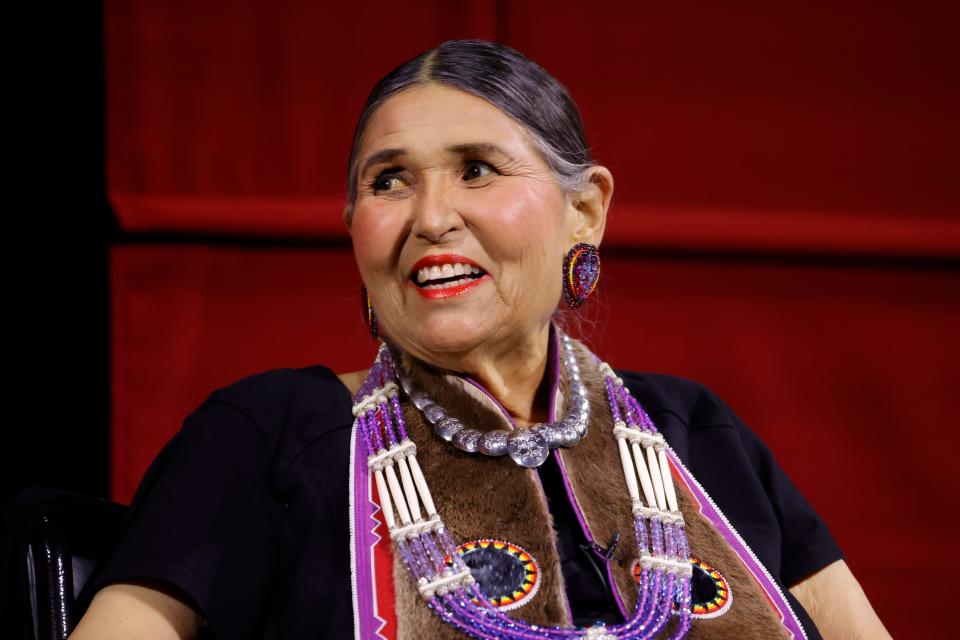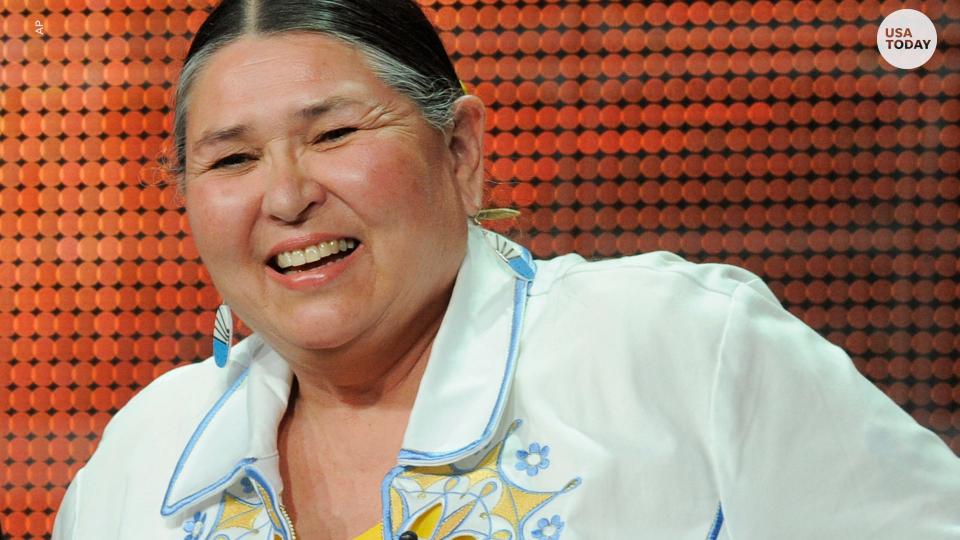Sacheen Littlefeather, Native American activist who declined Marlon Brando's Oscar, dies at 75
Sacheen Littlefeather, the Native American actress who famously declined Marlon Brandon's best actor Oscar in 1973, has died. She was 75.
News of Littlefeather's death was shared by the official Twitter account for the Academy of Motion Picture Arts and Sciences.
Her family confirmed in a statement to USA TODAY that Littlefeather died Sunday "peacefully at home" in Marin County, California, "surrounded by loved ones."
Littlefeather, who was Apache and Yaqui, was born Marie Louise Cruz on Nov. 14, 1946, in Salinas, California. The actress, a graduate of California State University in Hayward (now California State University, East Bay) who studied acting at the American Conservatory Theater in San Francisco, appeared in films such as 1973's "Counselor at Crime," 1974's "The Trial of Billy Jack" and 1975's "Johnny Firecloud."
She went on to co-found the National American Indian Performing Arts Registry.
'Never thought I'd live to see the day': Oscars apologize to Sacheen Littlefeather for mocked speech

In 2018, Littlefeather revealed she was battling Stage 4 breast cancer.
Her death came weeks after she received a long-overdue apology from the Academy Awards. Nearly 50 years ago, the actress and activist rejected an Oscar on behalf of "The Godfather" star Brando, who boycotted the ceremony to protest Hollywood's negative portrayals of Native Americans. Littlefeather delivered a speech on his behalf, which was roundly mocked and booed by many members of the audience.
On Sept. 17, Littleweather was honored in "An Evening With Sacheen Littlefeather," billed as a program of "conversation, reflection, healing and celebration" at the Academy Museum in Los Angeles. But Littlefeather had received a private apology from the Academy months prior in June.
Related: Sacheen Littlefeather apology is a reminder that Native Americans are still 'left out' in Hollywood
Sacheen Littlefeather, Native American civil rights activist who famously declined Marlon Brando’s 1973 Best Actor Academy Award, dies at 75. pic.twitter.com/OlpsoItlCw
— The Academy (@TheAcademy) October 3, 2022
"The emotional burden you have lived through and the cost to your own career in our industry are irreparable. For too long the courage you showed has been unacknowledged," read a letter of apology, signed by the Academy's then-president, David Rubin. "For this, we offer both our deepest apologies and our sincere admiration."
Littlefeather told The Hollywood Reporter in August that she was "stunned" to receive a formal apology.
"I never thought I’d live to see the day I would be hearing this, experiencing this," Littlefeather said. "When I was at the podium in 1973, I stood there alone."
But as Hollywood still struggles to make meaningful strides for Indigenous representation, some members of the Native American community found the public apology to Littlefeather the bare minimum.
"Honestly, it's been 50 years," Eric Buffalohead, chair of the American Indian, First Nations and Indigenous Studies department at Augsburg University in Minneapolis, told USA TODAY after the Academy event. "(It) definitely feels too little too late."
He added, "Hollywood has spent over 100 years portraying American Indians as a part of the past, stuck forever in 18th- and 19th-century settings. The fantasy of American Indians has replaced the reality of American Indians in people's minds."
The 12 most shocking moments in Oscars history: From Marlon Brando to 'Moonlight'
Littlefeather became the first Native American woman to speak on stage at the Oscars. Wearing a buckskin dress and moccasins, she delivered a 60-second speech explaining that Brando could not accept the award because of "the treatment of American Indians today by the film industry."
Littlefeather and Brando met through her neighbor, “Godfather” director Francis Ford Coppola. She had known Brando for about a year before he called her the night before the Oscars ceremony, invited her to his house and asked her to attend in his place.
The 1973 Oscars were held during the American Indian Movement’s two-month occupation of Wounded Knee in South Dakota, which Brando referenced in the speech she delivered.
As she exited the Oscars stage after the speech, "I was met with the stereotypical tomahawk chop, individuals who called at me, and I ignored all of them," she told Variety recently. "I continued to walk straight ahead with a couple of armed guards beside me, and I held my head high and was proud to be the first Indigenous woman in the history of the Academy Awards to make that political statement."
Political speeches at the Oscars were then still a rarity, and some in attendance saw the brief address as a break in decorum — and one that raised a subject not everyone was eager to consider.
"I don’t know if I should present this award on behalf of all the cowboys shot in all the John Ford Westerns over the years," Clint Eastwood said later in the evening, while presenting the award for best picture. Presenting best actress, presenter Raquel Welch cracked: "I hope they haven’t got a cause."

"I went up there thinking I could make a difference," Littlefeather told People magazine in 1990. "I was very naive. I told people about oppression. They said, 'You’re ruining our evening.' "
Littlefeather described the overwhelmingly white crowd as "a sea of Clorox." She said some audience members did the so-called "tomahawk chop" and that Brando’s house was later shot at.
In the years since, Littlefeather said she had been discriminated against and personally attacked for her brief appearance. On Sunday, the Academy shared a quote from the civil rights activist that read: "When I am gone, always be reminded that whenever you stand for your truth, you will be keeping my voice and the voices of our nations and our people alive."
Her family asked that donations be made to the American Indian Child Resource Center of Oakland, California.
Contributing: Jake Coyle, The Associated Press, and Kim Willis, USA TODAY
This article originally appeared on USA TODAY: Sacheen Littlefeather dies: Native American activist declined Oscar

 Yahoo Movies
Yahoo Movies 
